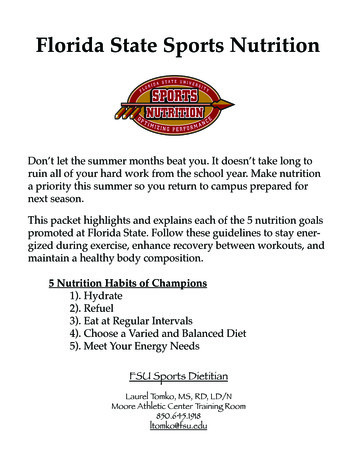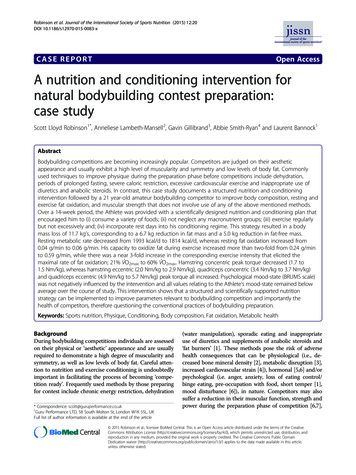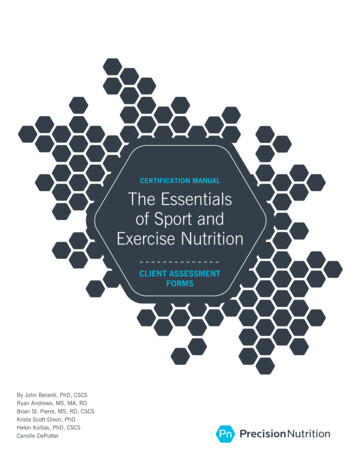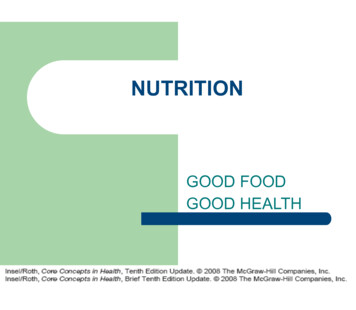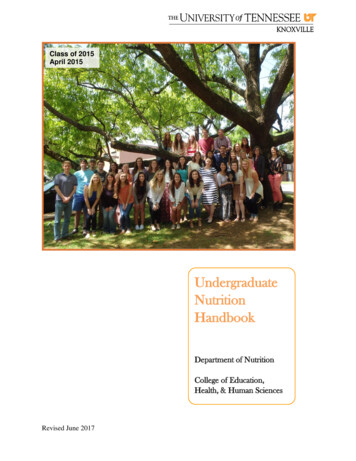
Transcription
Class of 2015April 2015Class of 2011April 29, 2011UndergraduateNutritionHandbookDepartment of NutritionCollege of Education,Health, & Human SciencesRevised June 2017
Table of ContentsWelcome and Introduction . . 1Meet the Nutrition Faculty . . 3Introducing the Nutrition Major, Concentrations, and Curricula . 8Course Descriptions . .10Transferring Courses from other Colleges & Universities . . . 13Students Transferring into Nutrition from other Majors . . 14Suggested Minors . . 15Suggested Electives . 17Nutrition and the Pre-Professional Major or Double Major . . 19Honors Programs and the Study of Nutrition at UT . 19Graduation Requirements . . 20Research Opportunities . . . 20Study Abroad . . 21Other National and International Opportunities . . 22The Undergraduate Nutrition Student Association (UNSA) . 23Scholarship Opportunities . 24Preparing for Supervised Practice Programs . Starting NOW! . . 25Eligibility to Become a Nutrition and Dietetic Technician, Registered (NDTR) . 30Contemplating Graduate School . . . 31Online Resources & Organizations . . 32Contact Us . . . . 33Revised June 2017
AppendixMission and Goals . . . 33Policies and Procedures . . 35DPD Course Listing . . 39Revised June 2017
Welcome to the Nutrition Undergraduate Program at the University ofTennessee!Fall 2017Dear Student,Thank you for your interest in studying nutrition at UT! If you enjoy the sciences, have aninterest in good health, and enjoy working with people, you are in the right place. The UTDepartment of Nutrition offers a Bachelor of Science degree in nutrition with concentrationoptions in Dietetics and in Basic Science. Ours is one of the largest programs in Tennessee and isacademically rigorous so that our graduates are prepared for a successful career, with manybecoming leaders in the field. Past graduates are employed all across the country as clinicaldietitians, community dietitians, sports dietitians for collegiate and professional teams, schoolnutrition personnel, lactation consultants, and as pharmacists, physicians, nurses, and physicianassistants, just to name a few. One recent graduate is a clinical sciences specialist for Nestlewhile another owns a local restaurant and healthy food delivery service. Regardless of yourcareer aspirations, our mission and goals (page 33) aim to guide the program to continuouslyimprove performance of our graduates. Established policies and procedures (page 35) guide dailyoperations. If you are interested in this exciting major, please see page 8 for information on howto declare a major in Nutrition and get started today. Applications for continuation in the majorand faculty advisor assignment are due in August each year for students preparing to enter thejunior-level curriculum. These can be found on the College of Education, Health, and HumanSciences Student Services website at ms/ andshould be submitted in the Student Services office, Bailey Education Complex 332. Studentsmust read this handbook and complete online orientation prior to submitting the application andbeing assigned a faculty advisor within the department.The program curricula include: Nutrition science: How the body uses nutrients at the cellular level and in the wholebody system plus food and nutrient needs throughout the life cycle in both health anddisease states. You will have extensive coursework in the sciences to form a basis forunderstanding nutrient functions. Students in the Basic Science concentration takeadditional coursework in this area. A senior-level course culminates with learning how toread and interpret the latest nutrition research for practice. The influence of attitudes, knowledge and beliefs on food consumption patternsamong individuals and groups: Coursework in psychology and community nutrition isincluded in the curriculum. Additionally, students in the Dietetics concentration takecourses on diet and physical activity assessment and on development of nutritioncounseling skills to learn how to help people make healthful changes in eating habits. Communication: You will have coursework in communication studies and many of themajor courses include oral presentations and research papers. The ability to criticallyevaluate nutrition information and effectively communicate nutrition information to otherhealthcare professionals, administrators, and the general public is a necessary skill.Revised June 20171
Effective management of food service delivery: Students in the Dieteticsconcentration have coursework that includes food science, food safety, management, andfoodservice operations. The roles of nutrition professionals in a variety of practice settings: All studentshave coursework on careers in nutrition and those in the Dietetics concentration have acourse on professional issues in the practice of nutrition and dietetics.Which concentration should I choose?This Dietetics concentration program is accredited by the Accreditation Council for Education inNutrition and Dietetics (ACEND) of the Academy of Nutrition and Dietetics (formerly theAmerican Dietetic Association (ADA)) as a Didactic Program in Dietetics (DPD). Therefore,successful completion of the bachelor’s degree in the Nutrition-Dietetics concentration at UTqualifies students to compete for placement in ACEND-accredited supervised practice programs.Following completion of a supervised practice program, students take a national registrationexamination to earn the Registered Dietitian Nutritionist (RDN) credential. Effective January 1,2024, a graduate degree (in any field) will be required in order to sit for the RDN exam. Youmay contact ACEND for additional information about accreditation:Accreditation Council for Education in Nutrition and DieteticsAcademy of Nutrition and Dietetics120 South Riverside Plaza, Suite 2000Chicago, Illinois 60606-6995Phone: 312-899-0040 ext. 5400Email: gistered Dietitian Nutritionists (RDNs) apply the science of nutrition by utilizing nutritionknowledge to promote health and/or treat disease in hospitals, clinics, community settings,private consulting practices, sports nutrition and corporate wellness programs, newspapers andmagazines, food and nutrition-related businesses and industry, pharmaceutical companies, andmore. Most of these settings require completion of a supervised practice program and the RDNcredential for employment. Supervised practice program entry is very competitive, so studentsinterested in this route should begin to prepare early (see page 25). For more detailed informationon careers in dietetics, see the Academy’s website careers information.Graduates of the Nutrition-Dietetics concentration not immediately entering a supervisedpractice program, but wishing to practice nutrition, are eligible to take the national exam tobecome a Nutrition and Dietetic Technician, Registered (NDTR). All students with a minimumof a bachelor’s degree who have completed a DPD are eligible (see page 30 in this handbook fordetails).As an alternative to completing the Dietetics concentration requirements and pursuing the RDNcredential, the Nutrition-Basic Science concentration provides an outstanding foundation forpursuing careers in pharmacy, nursing, medicine, veterinary medicine, dentistry and otherbiomedical sciences, as well as graduate study and research careers in nutrition and related areas.Revised June 20172
The Nutrition-Basic Science concentration includes courses such as biology and genetics,required for pre-health majors and for graduate study in the sciences, while excluding someapplied nutrition courses in foods, foodservice management, and counseling. It will not meetDPD requirements and students who choose this option will not be eligible to apply for ACENDaccredited supervised practice programs without additional coursework. However, we arepleased to be able to offer this alternative to students who desire careers outside of appliednutrition and dietetics practice. A Nutrition minor is also available.We hope the pages of this handbook will be of assistance to you as you consider the major andprogress through your undergraduate studies.Sincerely,Melissa Hansen-Petrik, PhD, RDNDirector, Undergraduate Nutrition ProgramDirector, Didactic Program in DieteticsClinical Associate ProfessorUT Department of NutritionJay Whelan, PhD, MPHProfessor and HeadUT Department of NutritionMeet the Nutrition FacultyBetsy Anderson Steeves, PhD, RDNAssistant ProfessorDr. Anderson Steeves joined the faculty in 2015 and teaches Nutrition 421:Diet and Physical Activity Assessment in the undergraduate curriculum. Dr.Anderson Steeves completed her bachelor’s degree at the University ofDayton, master’s degree in public health nutrition and dietetic internship atUT-Knoxville, and PhD at Johns Hopkins University Bloomberg School ofPublic Health. Her research interest is in community-based interventions toreduce health disparities and prevent obesity among under-servedpopulations. She often engages undergraduate students in her researchprojects through the Healthful Eating and Active Living through g-through-healthyenvironments-healthe-lab/.Revised June 20173
Ahmed Bettaieb, PhDAssistant ProfessorDr. Bettaieb joined the faculty in 2015 and has taught Nutrition 313:Vitamins and Minerals in conjunction with Dr. Ling Zhao and Nutrition420: Interpreting Current Nutrition Research Literature. After completinghis bachelor’s degree in Tunisia, Dr. Bettaieb completed his master’s anddoctoral degrees at the University of Quebec in Montreal and a postdoctoralfellowship at the University of California-Davis. He welcomesundergraduate researchers to his lab where his research focuses onmolecular and genetic mechanisms contributing to development of chronicdiseases such as obesity, diabetes, and cardiovascular disease. Additionally,he has worked closely with Dr. Donohoe in development and teaching of anew limited-enrollment laboratory course for undergraduate nutrition majorswith a basic science research interest.Guoxun Chen, PhDAssociate ProfessorDr. Chen teaches Nutrition 314: Energy Metabolism and MetabolicIntegration. He has his BS and MS degrees in Virology and MolecularBiology from Wuhan University in China and his PhD in Biochemistry andMolecular Biology from the University of Texas Southwestern MedicalCenter in Dallas, where he also completed a postdoctoral fellowship. He isan active researcher in the area of vitamin A, insulin action, diabetes, andobesity and has a number of publications in the area. He has been on facultyat UT since August 2006.Sarah Colby, PhD, RDNAssociate ProfessorDr. Colby joined the public health nutrition faculty in the UT Department ofNutrition in 2011. She has an AA degree in Theater from the New WorldSchool of the Arts, BS degree from Florida State University, MHS fromWestern Carolina University, and PhD in nutrition from the University ofNorth Carolina at Greensboro. Prior to coming to UT Dr. Colby was on thefaculty of East Carolina University in Greenville, NC. Her research interestsinclude obesity prevention with an emphasis on health communicationthrough novel nutrition education strategies (including marketing, arts, andtechnology). Opportunities may be available for undergraduate students togain research experience with Dr. Colby and her graduate students. Dr.Colby currently teaches NUTR 302 Life Span Nutrition.Revised June 20174
Dallas Donohoe, PhDAssistant ProfessorDr. Donohoe completed his BS degree in biology at Florida State Universityand his PhD at the LSU Health Sciences Center. Before joining the UTnutrition faculty in 2013, he completed a postdoctoral fellowship with theUNC-Chapel Hill Department of Genetics. His research focuses on the roleof the gut microbiome in energy metabolism and colorectal cancer. Heteaches NUTR 311 Physiological Chemistry and sometimes co-teachesNUTR 313 Vitamins and Minerals with Dr. Zhao. He also is involved indeveloping and teaching a new limited-enrollment laboratory course forundergraduate nutrition majors with a basic science research interest inconjunction with Dr. Bettaieb.Melissa Hansen-Petrik, PhD, RDNClinical Associate Professor; Director, Undergraduate Nutrition;Director, Didactic Program in Dietetics (DPD)Dr. Hansen-Petrik earned her BS at South Dakota State University, MS inhuman nutrition at Case Western Reserve University, and dietetic internshipat University Hospitals in Cleveland, Ohio. She came to UT with clinicalexperience in critical care, neurology, and nephrology. She earned her PhD innutrition at UT while investigating the role of omega-3 fatty acids in cancer.She currently teaches Nutrition 415 and 416: Clinical Nutrition I and II andhas authored textbook chapters on neurology and nutritional genomics forthose courses. Effective Fall 2016, Dr. Hansen-Petrik is also teaching asequence of elective clinical nutrition practicum courses that align withNUTR 415 and 416, respectively. Dr. Hansen-Petrik serves as director ofUndergraduate Nutrition, DPD Director for the accredited undergraduateprogram concentration, and advises the Undergraduate Nutrition StudentAssociation. She has been on faculty since 2001.Katie Kavanagh, PhD, RDN, LDNRevised June 2017Associate ProfessorDr. Kavanagh completed her BS and MS degrees and dietetic internship atUT and earned her PhD in Nutritional Biology from the University ofCalifornia-Davis in 2006. Her research focus is on infant feeding practicesand she has served as a reviewer for the Journals of Human Lactation, theAcademy of Nutrition and Dietetics, and Nutrition Education and Behaviorand has published and presented her findings. Dr. Kavanagh often hasresearch experiences available for undergraduate students. She conducts bothquantitative and qualitative research. Past opportunities have included phoneinterviews, transcription, data-entry, and some data analysis. See the Infant,Child, and Adolescent Nutrition Lab (ICAN) web page athttp://web.utk.edu/ ican/ for more information. She was named TennesseeAcademy of Nutrition and Dietetics Outstanding Dietetic Educator in 2012.Dr. Kavanagh teaches NUTR 412: Food and Nutrition in the Community andNUTR 413: Food and Nutrition in the Community Practicum in the fallsemester.5
Lee Murphy, MS-MPH, RDN, LDNLecturerMrs. Murphy earned her B.S. in public health nutrition from the University ofNorth Carolina at Chapel Hill and completed her MS-MPH degrees and dieteticinternship at UT. She worked at the Knox County Health Department as acomprehensive public health nutritionist for nine years, also working with UTgraduate nutrition students and as a preceptor in the UT dietetic internshipprogram. Mrs. Murphy has been involved in local leadership with the KnoxvilleAcademy of Nutrition and Dietetics and national exam writing and other effortswith the Academy of Nutrition and Dietetics. She teaches Nutrition 100:Introductory Nutrition, as well as continuing media advocacy efforts in thecommunity. She was named Tennessee Academy of Nutrition and DieteticsOutstandingDieteticEducatorin2013.Peggy Pratt, PhD, RDN, LDNLecturer (Part-time)Dr. Pratt earned her B.S. in dietetics from Kansas State University and hermaster’s and doctoral degrees in Nutrition and Food Systems Administrationfrom Texas Woman’s University. She has many years of experience inmanagement including hospital foodservice management, clinical nutritionmanagement, and school foodservice management. Dr. Pratt has taughtpreviously at both Texas Woman’s University and University of TexasSouthwestern. She is the owner of Radiant Nutrition and teaches NUTR 303:Nutrition and Dietetics Management.Hollie Raynor, PhD, RDN, LDNRevised June 2017ProfessorDr. Raynor earned her BS in nutrition from San Diego State University, andMS in public health nutrition and dietetic internship from UT. She earned herPhD in clinical psychology at SUNY-Buffalo and was a research facultymember at Brown University 2004-2007 focusing on behavioral interventionsfor obesity across the lifespan. She moved her research program to theUniversity of Tennessee in 2007, where she directs the Healthy Eating andActivity Laboratory (HEAL). Dr. Raynor teaches NUTR 422: NutritionCounseling and a number of undergraduate students have gained researchexperience working with HEAL. Types of activities in which students may beinvolved include assisting with orientations to introduce studies to participantsand obtain informed consent; conducting assessments (meeting withparticipants to collect diet and physical activity information); developingintervention materials (nutrition education materials); assist with interventiondelivery to participants (work with participants to help them change eating andleisure-time activity behaviors); managing data; and running participantsthrough experimental protocols. Dr. Raynor has partnered with Dietitians ofCanada to develop a nutrition counseling toolkit for nutrition professionals, andis involved in developing the prediabetes module for the Evidence AnalysisLibrary. Dr. Raynor was named Tennessee Academy of Nutrition and Dietetics6Outstanding Dietetic Educator in 2010.
Marsha Spence, PhD, RDN, LDNAssociate Professor (Research) and Director, Public Health NutritionProgramDr. Spence received all of her college degrees from The University ofTennessee, including a PhD in 2006 and a dual MS-MPH degree in 2000.She is the Co-Director of the Maternal and Child Health Bureau PublicHealth Nutrition Training Grant, teaches a graduate course in communitynutrition, and works with public health nutrition faculty and field agenciesto coordinate graduate students’ 7-week community field experiences. Shehas several years of experience teaching Nutrition 100 and Nutrition 412. Inaddition, Dr. Spence has extensive experience serving as a consultingdietitian for several rural East Tennessee school districts, conducting schooland community-based nutrition research to prevent childhood obesity.Currently, she is past Chair of the Food and Nutrition Section of theAmerican Public Health Association and is the Tennessee Academy ofNutrition and Dietetics Let’s Move Dietitian. For information e:http://web.utk.edu/ ican/ .Karen Wetherall, MS, RDN, LDNDietetic Internship Director and Senior LecturerMs. Wetherall is a Registered Dietitian Nutritionist and earned her MS inNutrition Education from Boston University. She has been the DieteticInternship Director at UT since 1995. She is active in the KnoxvilleAcademy of Nutrition and Dietetics, having served on the Board ofDirectors for many years. She is on the executive committees for twoAcademy Dietetic Practice Groups: Sports, Cardiovascular, and WellnessNutritionists (SCAN) and Behavioral Health Nutrition (BHN). For ten yearsshe worked as the sports dietitian with the Lady Vols. She owns andoperates a private practice focusing on weight management and eatingdisorders. She teaches Nutrition 201: Careers in Nutrition and Nutrition 410:Professional Issues in Dietetics.Revised June 20177
Jay Whelan, PhDProfessor & Department HeadDr. Whelan earned his PhD in Nutrition from Penn State University andcame to the University of Tennessee in 1991 from Cornell University(Ithaca, NY) where he was a Senior Research Associate and Supervisor ofthe Lipids
Diet and Physical Activity Assessment in the undergraduate curriculum. Dr. Anderson Steeves completed her bachelor’s degree at the University of Dayton, master’s degree in public health nutrition and dietetic internship at UT-Knoxville,






